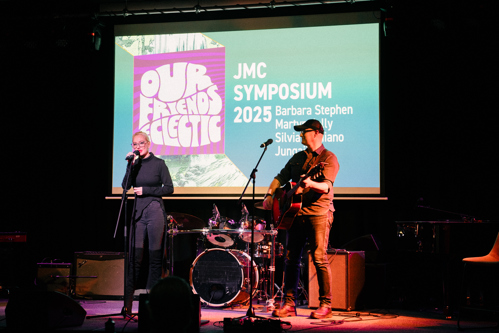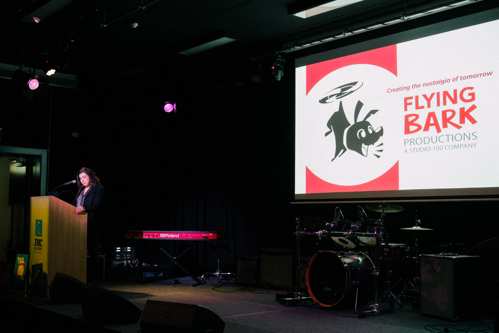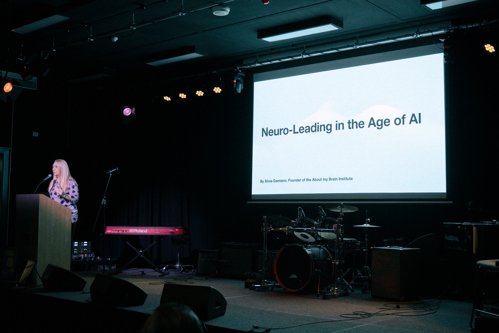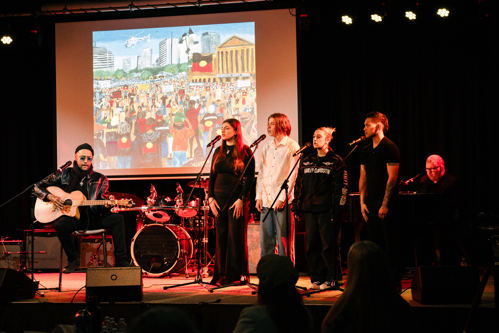Each year, JMC’s Academic Symposium plays an important role in helping to shape and celebrate our identity as a leading creative industries institution.
It brings our people together in one place from across the country and asks them to take part in the big conversations; how do creative educators remain relevant in shifting times? How do we lead with empathy, from the head, the heart, and the gut? We invited a diverse range of speakers and performers to help expand our thinking, whilst keeping creative education at the heart of the discussion. We received excellent support for this event from our senior executives, who understand that JMC’s academics seek unique forms of expression for shared questions and concerns.
This year, rather than impose a theme on the symposium at the outset, we waited to see what would emerge organically from the day’s discussions. Somehow, the contrasting experiences of our speakers led us to common ground. Each of our guests built upon the ideas of the previous speaker, weaving their own personal experiences of challenges and beliefs into one common story. By the day’s close we had reaffirmed the importance of human connection.

To begin the day, Sydney Campus Director Kylie Whitney and The April Family opened the stage with an alt-country set, reminding us that creative talent runs right through the organisation.
Our keynote speaker, Barbara Stephen, CEO from Flying Bark Productions, set the scene for the conversations that would flow throughout the day. Twice winner of the NSW Women in International Business Award, Barbara is a champion of women in leadership roles and has constructed an executive team which puts this into practice. Describing herself as ‘accustomed to being underestimated,’ Barbara’s skill and tenacity led her to become the first female CEO at a major production company in Australia at the age of 30. She talked about the importance of developing original Australian content, nurturing talent within companies, and fostering an organisational culture of openness whereby anyone can feel empowered to speak up.

Next, Associate Professor Martyn Jolly from ANU gave us a live ‘magic lantern’ performance, taking us back to the days before cinema, when the lanternist performer was as important as the slide show itself. His tales of shipwrecks and burning castles, spirit visitations and animating kaleidoscopic slides transported the audience to a time when live theatre and cinema were closely connected. Martyn spoke of the lost communal experience of performer and audience describing the all-important ‘aaaah’ sound of an audience spellbound by a transforming scene.
Next, as a special treat, Martyn and Braiden Toko from the Acting department performed a live magic lantern remix while music tutor Rick Grossman and his student band played ‘White Rabbit’, the 1960’s psychedelic classic by Grace Slick. This stirring, hypnotic ‘Art School experiment’ as Martyn called it, showcased the high standard and collaborative culture within JMC’s music department. With Rick’s guidance, singer Chiara Maccioni and the excellent band gave a performance which was powerful, trippy, and highly skillful. 
In the afternoon, neuroscientist and leadership consultant Silvia Damiano brought the discussion to the many challenges posed by generative AI, pointing out the absence of empathic leadership in the international technology sector. She highlighted the importance of thinking with the heart and gut as well as the brain. Silvia felt that creative educators are the ones who ‘should be racing to work with AI, “because you have the heart”. She also noted that teaching critical thinking and creativity will be even more paramount in an age of increased automation. In her view, human wisdom and imagination must always come first, with AI in a supporting role.

First nations songwriter and social justice advocate, Jungaji, brought the threads together as our final presenter for the day. Winner of the 2025 QMA for best World Music Song, with his debut album ‘Betting on Blak’ riding high in the 100% Independent Albums chart, Jungaji attended the whole symposium day, and generously spoke about the contributions of the other speakers. Inviting the audience to ‘feel, remember, and connect’ he yarned about the significant personal challenges which had led him to this point, before performing two songs from his album.

Jungaji had invited our music department to sing harmony for one of his songs, giving our students a rare privilege to work with the Gugu Yalanji language of northern Queensland. Jungaji described the invitation as a ‘beautiful exchange’ and he was right. Tutor Ben Ackland accompanied Jungaji on piano as he shared his emotional ‘vessels of cultural knowledge.’ Our audience did not need to speak Gugu Yalanji to recognise the universal language of shared human experience, suffering transformed into connection through song.
At the conclusion of the JMC’s 2025 Academic Symposium, the speakers, participants and attendees had together arrived at a theme: Transformation through connection.
Words by Dr. Damian Gascoigne



